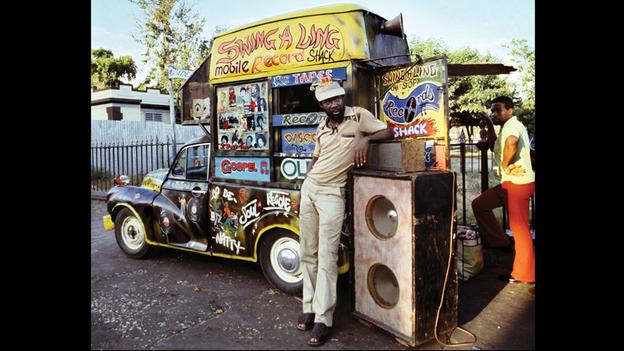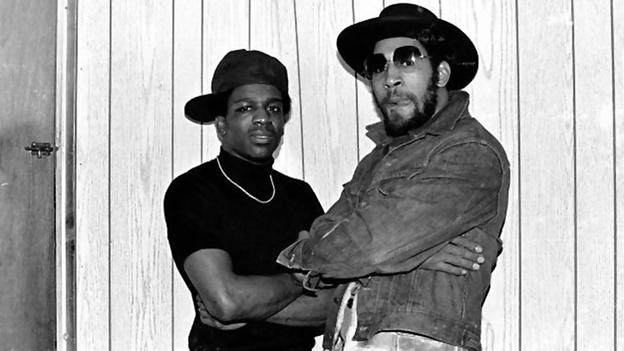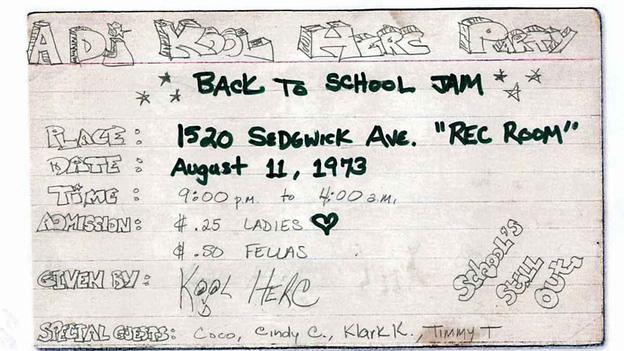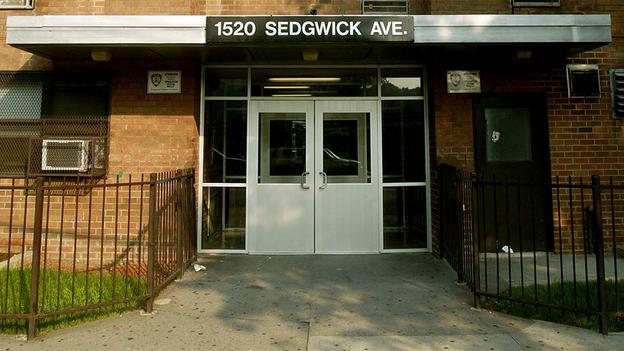It is 40 years since a ‘back to school jam’ in New York’s west Bronx kickstarted a movement and spawned a whole culture. BBC Culture’s Rebecca Laurence looks back on a party that changed the world.

On a hot August night in 1973, Clive Campbell, known as DJ Kool Herc, and his sister Cindy put on a ‘back to school jam’ in the recreation room of their apartment block at 1520 Sedgwick Avenue in the west Bronx. Entrance cost 25c for ‘ladies’ and 50c for ‘fellas’.
The party wasn’t special for its size – the rec room could only hold a few hundred people. Its venue and location weren’t particularly auspicious. Yet it marked a turning point – a spark which would ignite an international movement that is still with us today. As Kool Herc said in a recent statement: “This first hip-hop party would change the world.”
The legend is a simple one – but the factors leading to the creation of a hip hop culture were a fusion of social, musical and political influences as diverse and complex as the sound itself.
In his award-winning book, Can’t Stop Won’t Stop: A History of the Hip-Hop Generation, the journalist and academic Jeff Chang locates the foundations of hip hop in the social policies of ‘urban renewal’ pioneered by Robert Moses and the ‘benign neglect’ of Nixon’s administration. The building of New York’s Cross Bronx Expressway razed through many of the city’s ethnic neighbourhoods, destroying homes and jobs and displacing poor black and Hispanic communities in veritable wastelands like east Brooklyn and the South Bronx, while the government turned a blind eye to those affected.
“Hip hop did not start as a political movement,” Chang tells BBC Culture. “There was no manifesto. The kids who started it were simply trying to find ways to pass the time, they were trying to have fun. But they grew up under the politics of abandonment and because of this, their pastimes contained the seeds for a kind of mass cultural renewal.”
Break with the past
Hip hop signaled a profound shift at the beginning of the 1970s, following the FBI’s suppression of late ‘60s radical black groups and the waning of gang wars. Rather than taking political action, a new generation expressed itself through DJing, MCing, b-boying/b-girling (breakdancing), and graffiti, the ‘four elements’ of hip hop. Artist Fab 5 Freddy, who coined this term, argued that the looping interactivity of the ‘four elements’ proved hip hop went beyond a purely musical or artistic movement – it was an entire culture.
Marcyliena Morgan is Professor of African American Studies and director of the Hip Hop Archive at Harvard University. She asserts the importance of celebrating the positive narratives generated by the hip hop generation.
“Hip hoppers literally mapped onto the consciousness of the world a place and an identity for themselves as the originators of an exciting new art form” she tells BBC Culture. “They created value out of races and places that had seemed to offer only devastation.”
Kool Herc, along with Afrika Bambaataa and Grandmaster Flash, is one of the ‘three kings’, the ‘holy trinity’ of hip hop’s early days. But Herc’s story, insists Chang, is where it all started: “Without DJ Kool Herc, we wouldn’t be talking about [hip hop] now, 40 years later, all around the world” he says.

Clive Campbell was born in Jamaica, moved to New York in 1967, and picked up the nickname ‘Hercules’, (shortened to ‘Herc’) for his impressive stature. His father, Keith had a diverse record collection, and as the technician for a local band – and importantly for Herc’s burgeoning DJ career – access to sound equipment. Herc began DJing at house parties where he developed some important technical innovations. He found a way to make his set-up the loudest around, using two turntables and a mixer to switch between records (with the labels soaked off, Jamaican-style, to protect his secrets). Inspired by a youth spent watching rival sound systems in Kingston, Herc brought Jamaican culture with him to the Bronx – the booming bass and dub sound, and the custom of ‘toasting’ or talking over records, which his friend Coke La Roc used to powerful effect at the Sedgwick Avenue party.

Even more importantly, Herc observed that the b-boys and b-girls were going wild for the instrumental breaks in the records, and he began searching for the tracks – and the breaks – to please the dancers. His most famous musical discoveries – Bongo Rock and Apache by The Incredible Bongo Band, were purely instrumental: the bongo and conga beats kept the crowd dancing for longer. It was a simple observation– but the creation of the ‘breakbeat’ would be one of the key innovations in contemporary dance music.
Such was the popularity of his block parties, that by the end of 1973, Herc could no longer DJ in spaces as small as the Sedgwick Avenue rec room. He moved into bigger clubs and the Bronx’s Cedar Park, and for a few years – with his crew the Herculoids – was the ultimate draw in the area’s music scene. But by 1977, his star had waned and other rival New York DJs, notably the South Bronx’s Afrika Bambaataa and Grandmaster Flash were waiting in the wings.

And what happened to 1520 Sedgwick Avenue? In 2007, Kool Herc was involved in a campaign to stop the block being sold to developers. The recreation room at 1520 Sedgwick was officially recognised by NYC Housing Preservation as “the birthplace of hip-hop”. This weekend, 40 years after hip hop’s birth, the normally reclusive Herc will be DJing alongside Coke La Roc at events around New York City.
Creation myths
The story of hip hop’s genesis is a legend as much shrouded in mythology as that of punk and the Sex Pistols’ gig at the Lesser Free Trade Hall in Manchester three years later. That gig has become legendary as the birth of post-punk, indie and the entire Manchester scene. Thousands have since claimed they were there – although the actual number that attended is better estimated at between 40 and 100. What makes these tales so important?
“Every culture needs a creation myth” says Chang. “These stories tell us about the kinds of values we want to transmit. I think the story of Herc and Cindy’s party, in ways we perhaps don’t realise, speaks to the need for joy amidst turmoil, the power of creativity against destruction, the ‘started from the bottom’ ethic that youth will always find a way to express itself.”
Remembering and preserving the legacy of 1520 Sedgwick Avenue, DJ Kool Herc and the night of 11 August 1973 is a way to keep these positive values alive. “The Bronx won the rights to the DJ history through constant repetition of the first time DJ Kool Herc connected his sound system and mixed records” Professor Morgan says, and hip hop’s pioneers transformed “the land of the ghetto into the land of myth and the future.”
Jeff Chang agrees. For him, looking back to hip hop’s early days is also a way of looking forward.
“I’m not a purist or a nostalgist” he says. “But I believe in the values that have sustained hip hop from the beginning: inclusion, recognition, creativity, and transformation. In the end, hip hop is about teenagers, it’s about youth. And as long as they are taking those values forward, hip hop won’t die.”





